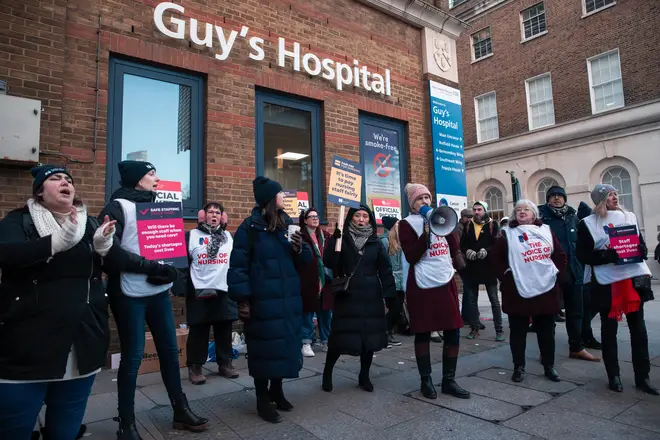
Ian Payne 4am - 7am
22 December 2022, 22:23 | Updated: 22 December 2022, 22:30

The number of flu patients in English hospitals has "skyrocketed", sparking warnings that this season could be worse than pre-pandemic years.
An average of 1,939 people with flu were in hospital each day last week, up 67% on 1,162 the previous week, according to NHS England data.
There has also been a surge in the number of flu patients in critical care beds, with the daily average standing at 149 last week, up 72% from 87 the previous week.
To put the growth of cases into perspective, at the same time last year the NHS had only two flu patients a day in critical care and 32 in general hospital beds.
Last week flu-related hospitalisations overtook Covid-19 related admissions for the first time since the pandemic began, with cases standing at 6.8 per 100,000 people in the week to 11 December, compared to 6.6 per 100,000 for Covid.
Read more: Ambulance workers to stage two more strikes in January

The rate of flu admissions currently stands at 8.3 per 100,000 people - a level not seen since the 2017-18 season, with hospitalisations the highest among over-85s and children aged four and under.
All children aged two and three are eligible for a flu nasal spray vaccine which is being offered by local GPs, but only 38.8% of two-year-olds have received the vaccine so far, along with 40.9% of three-year-olds,
That's well below the take-up reached at this point in previous winters. Interim chief executive at NHS Providers, Saffron Cordery said NHS trust leaders are expecting this Christmas to be "one of their darkest to date".
She said: "As they work hard to mitigate the impact of ongoing strike action, they are also having to contend with an incredibly long list of other serious challenges.
Read more: 'I want money spent on patients': Health minister to intervene as cash-strapped NHS offers £115k for diversity chief

“After very few flu cases in the last two years, in part due to social distancing during the pandemic, this flu season is looking far more severe compared to recent years before the pandemic.
“The surge in flu has impacted bed occupancy, which continues to be above levels considered safe. More patients are also staying longer in hospital due to greater severity of illness and delayed discharges, which remain a real concern and puts a massive strain on the entire health and care system, including community care and social services.”
Dr Susan Hopkins, chief medical advisor at the UK Health Security Agency (UKHSA), said that as well as those eligible getting vaccinated, people should also stay at home if they feel unwell and wear face coverings in enclosed spaces to prevent infections.
Separate data shows there were 721,301 calls to NHS 111 services last week, up from 706,129 the week before. NHS England said this was “near-record” level demand and “significantly” more than usual for this time of year, up almost 60% from the 452,644 calls in the equivalent week in 2021.
This rise in demand is understood to be partly driven by parents concerned about symptoms of Strep A, with the current wave of cases killing at least 24 children in the UK.
NHS England national medical director Professor Sir Stephen Powis urged those eligible to get their flu and Covid jabs.

He added: “As well as the impact of industrial action last week, it is clear that the NHS is facing enormous pressure ahead of Christmas with the number of flu cases in hospital and in intensive care rising week-on-week, on top of significant increases in staff sickness rates and near-record demand for services like 111.
“Despite this, NHS staff continue to deliver a significant amount for patients – dealing with near record 111 calls as well as continuing to make progress on Covid-19 backlogs.
“The NHS has prepared for winter extensively with more beds, extra call handlers as well as the expansion of falls response services, control centres and respiratory hubs, but with flu hospitalisations and Covid cases on the rise, the best things you can do to protect yourself is to get vaccinated if you’re eligible.”